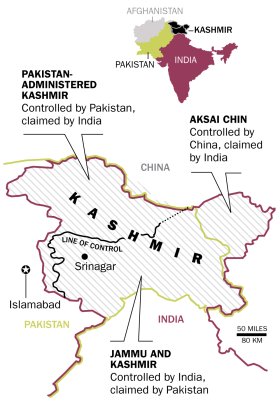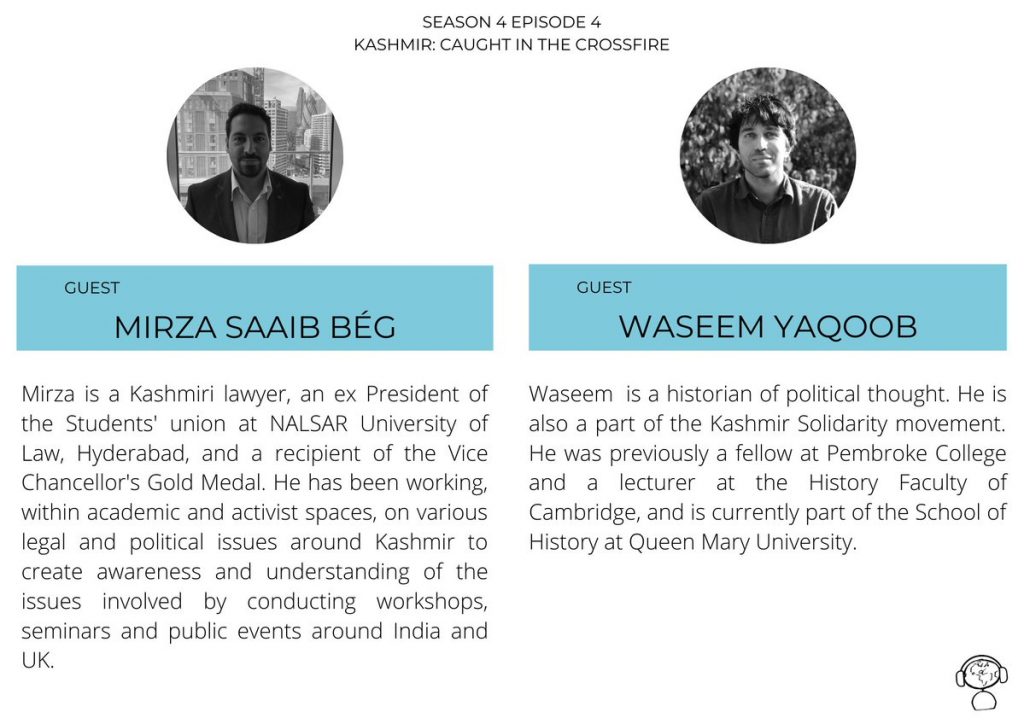In Kashmir, thousands of people are living in constant fear of detention and unrest. These conditions are part of a long history of struggle between India and Pakistan over the semi-autonomous state. Recent developments, including the repealment of Article 370 and the communication blackout, have further worsened conditions, leading to serious human rights infringements. This episode gives insight into the complex historical and political processes at play as well as how the everyday lives of Kashmiris are affected.
Kashmir has been a site of contestation between India and Pakistan since 1947 – the year of India’s partition. That year, a Hindu Prince named Maharaja Harri Singh was in charge of governing the Muslim-majority region and was presented with the choice to join either India or Pakistan. At the time, the region was struggling against insurgents from Pakistan, which shaped his decision to become part of India. Article 370 was enshrined in the Indian constitution, which gave the state of Kashmir a semi-autonomous status and control over its own laws, defence and foreign relations. Hence, while Kashmir is essentially ruled by a state governor with special privileges, Kashmir’s borders are administered by India, Pakistan and China.

The past few months have seen a sharpening of the conflict caused by several key events. Firstly, the Indian government initiated a communication blackout which included the complete shut-down of internet and phone lines. Our guest speakers explain that this is an important political strategy, as the only narrative of the conflict that is available externally is the one produced by the Indian government. However, the blackout does not only affect communication between families and reporters but also has economic and social dimensions. Hospitals can no longer access data on patients, severely impacting the provision of healthcare. Meanwhile, farmers are cut off from the international market and suffer severe economic consequences.
On August 5th of this year, India’s prime minister, Narindra Modi, repealed Article 370 and sent military troops into Kashmir, making it the most densely militarised zone in the world. The region has since experienced numerous arrests of political leaders and youths. These can be traced back to the Public Safety Act, which grants the Indian government the ability to detain any individual without trial for up to two years. The ‘lawless law’, as Amnesty International has pointed out, severely restricts the agency of Kashmiris and has resulted in incidences of physical violence and torture. The stories told by our speakers conjure up a picture of how India retains control of the region through “naked coercion”.
“One million military soldiers for a population of eight thousand people”
The control over the narratives surrounding the conflict are a key political tool used by the different parties to shape the situation. For one, the widespread attention given to the ongoing dispute between Pakistan and India is hiding the fact that Kashmir, itself, is a political community with claims to sovereignty. Despite being an important third party, Kashmiris have never been given a chance to vocalise their concerns on the international stage. Considering the perspective of the Kashmiris gives right to a third option – autonomy – which up until this point has not been seriously considered. Despite ethnic and religious differences among Kashmiris, there exists a strong political identity with the overwhelming majority supporting the claim for a politically independent community.
“The only thing that would stop these human rights abuses reoccurring is self-determination, so to talk about human rights without self-determination is to miss most of the story”
Intertwined with this are discourses of nationalism. Some claim that the conflict has resulted at least in part from the nationalist project of the Bharatiya Janata Party (BJP). India’s ruling party is attempting to increase Hindu settlements and alter the majority-Muslim demographic of Kashmir. Furthermore, the dispute can be analysed as an imperialist project shaped by the bureaucratic system inherited from British colonial rule. Our speaker highlights the important fantastical space that Kashmir occupies in the Indian imagination since colonial times, which further feeds into desires of control over the space.

Links for further information:
- A brief history of the conflict – https://www.telegraph.co.uk/news/1399992/A-brief-history-of-the-Kashmir-conflict.html
- The Washington post on the crackdown – https://www.washingtonpost.com/opinions/2019/10/23/indias-crackdown-kashmir-has-paralyzed-silenced-entire-communities/
- The Times on the current situation – https://time.com/5706847/what-happens-now-kashmir/
- Al Jazeera on the current situation – https://www.aljazeera.com/indepth/opinion/day-story-kashmir-changed-191024074602559.html
- Kashmir solidarity movement – https://www.standwithkashmir.org/who-we-are
